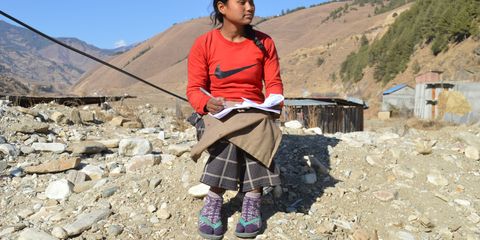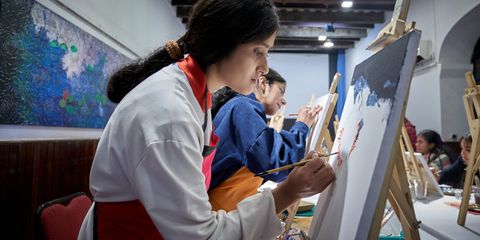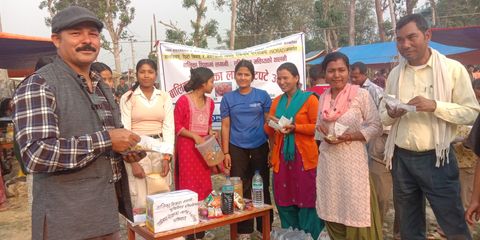Girls speak out against online abuse in Nepal
2 July 2021Manisha, Swastika and Shrijana have been targets of online abuse. They share their stories, including how Girls Out Loud, a safe online space where girls can discuss the issues they face, has supported them to protect themselves.
Girls Out Loud is a safe online space, a closed Facebook group of girls and young women between 13 and 24. This space is moderated by trained personnel and is where girls discuss varied topics related to gender.
As girls freely discuss their experiences and get a better understanding of various issues ranging from sexual health and rights, menstruation, gender-based violence and self-confidence to safety and safeguarding, girls have begun to gain confidence to speak up on such issues outside of the group as well.
The members inspire and support each other to challenge the views of family members, friends, teachers, and even religious leaders.
This platform has given us insight into what issues matter to girls the most, what are most important to them, how girls feel about the situation in their communities, and what they think should happen to bring about the right change.
As a consequence of the COVID-19 pandemic and its resultant lockdown, the topic of discussion these days is around digital security as most of the girls take to online platforms to catch up on the school curriculum and to be in touch with their friends and families.
Raskhya Paudyal, the Project Lead for Girls Out Loud Nepal comments, “With the advancement of digitalisation, it’s crucial that girls and young women are well consulted. Access to digital technology is a major factor contributing to gender equality and has been a blessing to humankind but on the flip side, the girls are also facing online abuse and harassment. Their safety is our prime concern.
“Therefore, it is important that girls are well aware of the pool of operational benefits as well as the safety and security issues that might come together with increased access to digital technology. Girls’ access to digital tech would also require effective laws and policies and programmes to make the best use of it and allow them to be free from any risk or violence associated with it.”
Here are some testimonials from girls from the group who speak out against abuse and harassment.
“I receive abusive comments on my dance video”
Manisha is a 19-year-old dancer from Banke and a runner-up in a dance reality show in 2020. She is quite an avid social media user and regularly posts her dance video. “I receive a lot of love and appreciation in my social media handles but at the same time there are abusive messages in the post shared in the dance reality organiser’s YouTube channel.”
In September 2020 when the nation was still in lockdown due to the COVID-19 pandemic, Manisha reached out to Girls Out Loud Nepal’s moderator sharing screenshots on how she was harassed online by her friend using very abusive language.
“I could not believe that my friend was sending me messages using filthy words. It was very painful and stressful. It took me about a week to realise that this was not acceptable and that I ought to do something about it.” When Manisha heard that the Girls Out Loud group was discussing online safety and security, she reached out to them.
“I initially thought of blocking his account but realised that was not the solution. I reach out to my friends in my girls’ club and in Girls Out Loud to report the account. I am happy that we could report it.”
Manisha has been active in the group and has attended many sessions including the one on online abuse where girls were informed on reporting incidents in the cyber-crime bureau.
“A few weeks after the girls’ meet-up, my brother excitedly told us that he received an email stating that he had won Rs. 25 Lakh (2.5 million Rupees). I immediately informed him that it was a spam email and he should not share any personal information or even respond to the mail. We had discussed this during the Girls Out Loud meet-up.”
“I replied to a message sent by a stranger and was mentally disturbed”
“I received a message on my WhatsApp from a young girl named Stephanie. It was a week-long friendly conversation,” says 20 year-old Swastika.
Swastika did not find anything suspicious and was quite comfortable sharing her personal information.
“After a week, Stephanie informed me that she was in trouble. She said that she was in the US and she was going to be deported.” She told Swastika that she needed to transfer $1,500,000 USD to a trustworthy person. “This freaked me out,” added Swastika.
A few days later, she received a copy of Stephanie’s identity card and the certificate of anti-money laundering from the United Nations Central Bureau of Investigation. Swastika’s name and address were mentioned clearly in the document. “She told me that she was in the process of shipping the amount in a huge package. She shared with me the photos where my name and contact number were mentioned.”
“Ever since this news, I was not able to sleep nor eat. Neither could I share this with my parents. I realised that I made a big mistake giving all my details to her.”
Swastika then reached out to the Girls Out Loud moderator and explained how stressed she was. The moderator sought the support of ChildSafe Net, an NGO working in online safety in Nepal. There were no safety threats. Nevertheless, she realised she should not entertain messages from a stranger.
“I have to get online because the schools are closed in the pandemic”
Shrijana says, “I was just getting comfortable with online classes and enjoying my studies. When one day I received a message from a girl on my Facebook. She said she would pay me if I arrange a girl for her. What does that even mean?”
Shrijana recalls the incident and wonders how she became friends with her on Facebook. Her first message to Shrijana was whether she could help her. “I thought she might be in trouble and extended my help by replying. She said she is a Nepali and asked me where I live. Then she replied she needs a girl in Nepaljung.”
“My heart pounded. I felt she is accusing me of being a trafficker or she thinks I am interested in such activity. I immediately blocked her.” Shrijana does not have her own mobile phone. She shares her mother’s phone for her online classes. She was even scared if her mother would find out.
A few days later, Shrijana received a call from her friend. Her friend mentioned a similar incident. She was surprised how both were receiving the same message from the same person. They thought the messages were from human traffickers and they might be trafficked if they keep replying.
Shrijana reached out to Girls Out Loud and the moderator explained how she could report the account. Both agreed to share the screenshots of the conversations in the Girls Out Loud group. They asked if any other girls have come across this profile. They alerted the group and asked everyone to report the account. One of the girls in the group suggested Shrijana make her account private and not allow strangers to message her.
Categories: Campaigns, Protection from violence, Youth empowerment


